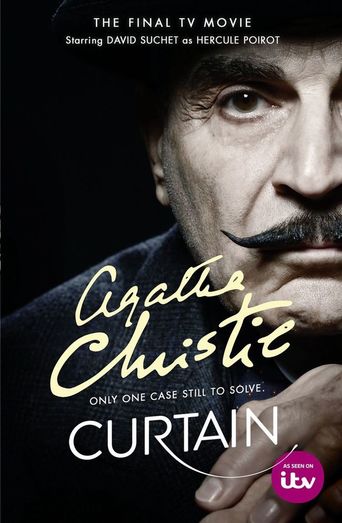kem-erd
The production is as great as it has always been. I also liked the portrayal of the tattered house and the dark scenes, in line with bad health of Poirot. My complaint is that the way Poirot committed his own murder was not nearly half as smart as the murderers Poirot caught, even worse it was not plausible; even if we accept that Poirot would indeed commit such a crime. Of course, there is nothing the production team could do about it, if they were not to grossly deviate from the source. I suppose, Christie was really bored of Poirot and could not think of a better way of getting rid of him. A disappointment overall, but not because of the team that produced the episode.
grantss
Hercule Poirot is ailing, and close to death. He travels to the estate Styles to convalesce and invites his old friend Hastings to join him. Styles has a nostalgic significance to Poirot as it was the location for the first case that Poirot and Hastings solved together. Poirot's reasons for calling Hastings down are not all about nostalgia or farewells - he believes a murder is going to be committed and, being unable to walk, he needs Hastings to be his eyes and ears. Hastings has another interest in being there - his daughter, Judith works there, as an assistant to chemist Dr Franklin. Sure enough, within a few days, Dr Franklin's wife dies, poisoned. The inquest calls it suicide, but to Hastings and Poirot it looks like murder. Problem is, the prime suspect is Hastings' daughter...The final Poirot, and probably the worst of all the Poirots, plot- wise. Poirot is completely out of character here. Always the one for high-mindedness, idealism, obeying Christian values and justice through the courts, here he becomes a vigilante and murderer. Even worse, his target is not a murderer, but merely a master-manipulator. The other issue with this is the notion that you're not responsible for your own actions. If you murder someone but someone subtly manipulated you into doing it, it's their fault, not yours. What nonsense! (Though consistent with the sort of bs the media and many Facebook warriors trundle out regularly).The only thing keeping this from being a very unsatisfactory end to the series is the emotional value. Quite sad to see Poirot in the state he's in. Nostalgic to see him reunited with Hastings, especially in the same place they first worked together. The introduction of Hastings' daughter also adds an element of generational change and the passing of time.Overall: Not terrible but Poirot deserves a better send-off than this.
surangaf
One has to be a brainless fan of Cristie and Poirot(in either the books or series who are somewhat different) to enjoy this episode.Episode is a faithful adaptation of the book in main story points, skillfully fitted to character of Poirot, with his blinkered morality, as developed in later 'darker' episodes of the series.From moral point of view, lousy logic used by Poirot to justify his murdering, and absolving of other murderers who have freely chosen to commit crimes, testify to either severe deterioration of his much referenced 'little grey cells', or Cristie's ironic revenge after developing a strong dislike for her character's smug pseudo rationality. Adapters did point to rather hypocritical moral compass of Poirot in several of the later episodes, such as 'The Clocks'. However they never seem to have the courage to carry it through to the end in any of them, and always dropped the ball before exposing the absurdity of Poirot's moral pontificating. They succeeded better when there is a distance between Poirot and characters going through a murder induced moral crisis, as in 'The Murder on the Orient Express'.Here too adapters fail to challenge Poirot's irrational murder. Nor do they leave the story at the superficial moral level Cristie displays in books. Unlike her, they raise the moral issues explicitly and seriously, but instead of confronting them in their complexity, they let Poirot getaway with absurdity.By the way, adapters in later part of series tried to imply that Poirot's blinkered morality is due to his pious Catholicism. However some of his moral positions do not fit with the Catholic teachings. If he is confused it due to his brain being confused.Actors were good in the episode, but unlike in almost all episodes in series, up to but not including final season, production design was bad.
Ryan Yamada
It's difficult, perhaps nearly impossible, to write an objective, clear- eyed review of Curtain at this point. Those of us who enjoyed Suchet's definitive portrayal are filled with a mix of emotions. So I won't even try to be objective.The setting was drab and dark, yes, but that, I think, was part of the point. A sumptuous, beautiful setting, like that seen in Five Little Pigs, would've seemed out of place. Styles is a decayed, dying home, a shadow of itself -- and so, it seems, is Poirot.Closer observers of UK television and movies might recognize members of the cast and comment on their ability to carry off their roles. I can only say that I thought all the actors did, at minimum, competent jobs. Hugh Fraser and Aidan McArdie deserve particular commendation for turning in wonderful performances. It nearly goes without saying that David Suchet proves, yet again, why he is the definitive Poirot.The expectations for this episode were tremendous. I'd say that the production did an excellent job satisfying Christie purists, an easier task given that she wrote this at the height of her powers. A wonderful way to close out a wonderful series, n'est pas?


